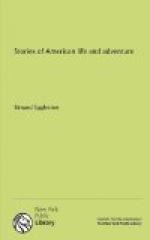They were glad to see the man who made the best lenses in the world. His telescopes had helped them to find out many new things never seen before. By this time Mr. Clark was coming to be known in his own country. He got an order to make the largest glass ever made for a telescope in the whole world. This was to be put up in America. Nobody had ever dreamed of making so large and powerful a telescope.
After a long time the great glass for this telescope was ground. Mr. Clark set it up to try it. His younger son, Alvan, who was helping him, turned the telescope so as to look at the bright star Sirius. As soon as he had looked, he cried out in surprise, “Why, father, the star has a companion!” Sirius is a sun. It has a satellite, a dark star like our world revolving round it. Nobody had ever been able to see this dark star before. But this telescope was stronger than any that had ever been pointed at the sky.
Mr. Clark now looked through the tube himself. Sure enough, there was the companion of Sirius, never seen before by anybody on the earth. The large glass which had been a year in making had won its first victory. But Mr. Clark made much larger glasses even than that one. He had nobody to show him how. But by patient thought and hard work he had made the greatest telescopes in the world. Medals and other honors were sent to him from many countries.
ADVENTURES IN ALASKA.
[Illustration: Scene in Alaska.]
The Copper River of Alaska flows from north to south into the ocean. The Yukon River, which is farther north, runs from the east toward the west. It was known that the waters of these two rivers must be near together at the place from which they started in the mountains, but it was not known whether anybody could pass from the valley of the Copper River over the mountains into the valley of the Yukon. A scouting party was sent to find out whether the crossing from one river to the other could be made. This party returned, saying that it was impossible to pass from the Copper River to the Yukon, because the mountains were too high and steep.
In 1885 General Miles sent Lieutenant Allen to try to find a pass from the valley of the Copper River to that of the Yukon. Lieutenant Allen was a very determined man. He set out with the resolution to find some way of crossing the mountains, however much labor and suffering it might cost. He took two soldiers, and had two other white men with him, and he got Indians to go with him from place to place as he could. The party started up the Copper River in March. From the first their sufferings were very great. They had to travel day after day, and sleep night after night, with their clothes wet to the skin. They soon found that they could not take their canoe, on account of the ice. They had to leave most of their provisions, because they could not carry them. Some nights they sat up all night in the rain.




